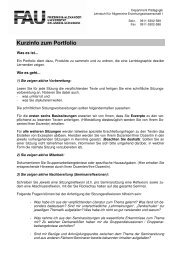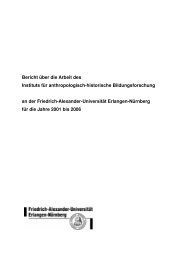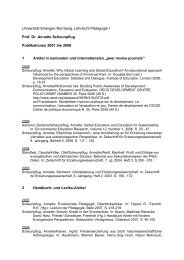ZEP - Lehrstuhl für Allgemeine Erziehungswissenschaft I
ZEP - Lehrstuhl für Allgemeine Erziehungswissenschaft I
ZEP - Lehrstuhl für Allgemeine Erziehungswissenschaft I
Sie wollen auch ein ePaper? Erhöhen Sie die Reichweite Ihrer Titel.
YUMPU macht aus Druck-PDFs automatisch weboptimierte ePaper, die Google liebt.
<strong>ZEP</strong>30. Jg. Heft 1 März 2007 Seite 15Research Issues and ThemesAn early activity of the Research Centre was a seminar for40 UK academics that identified the following key researchissues and questions:- What underlies government policy on Development Educationand how does this political commitment translate itself intopractice and understanding and are the objectives envisaged bypolicy-makers for example realised in the classroom?- How can we demonstrate to policy-makers that a globaldimension is just as important (or almost just) as say literacyor numeracy?- Definitions of development education within Europe andrelation to conceptual influence from learning in Africa, Asia,Latin America?- What constitutes the theoretical framework of developmenteducation and how do we develop this theory andconceptualisation?- There is a need to map the sector and to identify whereand what are the connections between development educationand related terms such as ‘global education’, ‘globalcitizenship’, ‘education for sustainable development’ and‘international dimension.’- What does DE in the North look like to people in the Southand what is the nature of the relationships and partnershipsbetween practitioners in this area North and South?From these discussions the seminar agreed to developthe following themes as the basis for ongoing debate anddialogue:- The relationship of policy and practice and to look atapproaches in different countries as to what and how developmenteducation practice mirrors and reflects governmentand NGO policies;- The question how greater understanding and engagementwith the global dimension can be reflected within the trainingand education of teachers;- The relationship between themes and perspectives ofdevelopment education to the internationalisation of highereducation;- The concept of development education and its frameworkand relationship to other concepts;- Partnerships and Linkages between schools in the Northand the South – value, influence and impact (see www.ioe.ac.uk/development education research centre).International Debate and DialogueKey to taking forward these research ideas and themes isthe need for debate and dialogue at an international level.The GENE network has been an important initiator of suchdebate as can be demonstrated by its support for the GlobalEducation in Europe conference at Maastricht in 2002 and theLearning for a Global Society Conference in London in 2003(O’Loughlin/Wegimont 2002; 2003). The network was also asupporter of the Development Education Theory, Policy andPractice conference organised by the DEA and the Instituteof Education in November 2005. This event attended byover 150 academics, NGO practitioners and policy-makersfrom around the UK and elsewhere in Europe identified theneed for more debate particularly around the areas of dealingwith complexity, multiple perspectives and critical engagement.Presentations and comments from participants notedthe need to move on from seeing development education asabout responding to agendas of government and NGO needsto that of recognising the centrality of the learning process.Development education should not be about changingpeople’s behaviour to pre-determined goals and aspirations,but opening up minds to enable them to critically re-assesstheir own views and perspectives on the nature of the worldin which they are living (see.www.dea.org.uk/conferencepresentations).As Morgan has commented, development education andits related disciplines need also to engage in wider educationaland philosophical debates, particularly in the contextof dealing with complexity and debates around place andscale (Morgan 2004). These points have been re-inforced byAndreotti who has stated that ‘in order to understand globalissues, a complex web of cultural and material local globalprocesses and contexts needs to be examined and unpacked’.She goes on to pose that key to debates are notions of power,voice and difference. ‘We need to engage with our own andother perspectives to learn and transform our views, identitiesand relationships’ (Andreotti 2006).Long-Term Benefits of Having aResearch CentreEstablishing a research centre around a theme that at presenthas minimal academic profile is a great risk. But if it issuccessful it could play a major role in changing not onlypolitical and educational support for development educationand its related terms, it will provide evidence of its value tothe educational needs of societies.The following could be argued as the outcomes the Centreis working towards:- Governments will have bodies of independent evidenceand research that could be used to justify and support moreresources and work on the ‘global dimension’ to education.- National organisations responsible for policy developmenton development education and related subjects will be moreaware of development education through publications, eventsand engagement in strategic initiatives.- NGOs engaged in Development Education practice willbe able to refer to independent research and publications thatdemonstrate the value of their work. A wider educationalaudience will know their work.- The educational research community internationally willbe more aware of development education and the contributionit can make to learning. Those members of the academiccommunity who are interested in development education willbe encouraged to undertake more research work in this areaand publish papers on these themes.- The Development studies community internationally willbe aware of where and how development education links to
















